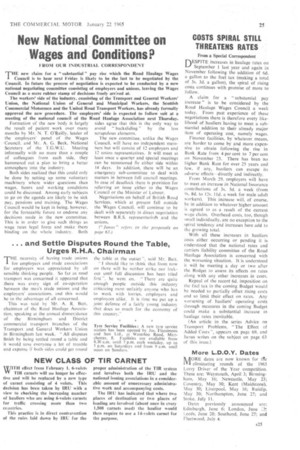New National Committee on Wages and ConditionsP
Page 27

If you've noticed an error in this article please click here to report it so we can fix it.
FROM OUR INDUSTRIAL CORRESPONDENT
r-FHE new claim for a " substantial " pay rise which the Road Haulage Wages I. Council is to bear next Friday is likely to be the last to be negotiated by the CounciL In future the process of negotiation is expected to be conducted by a new national negotiating committee consisting of employers and unions, leaving the Wages Council as a mere rubber stamp of decisions freely arrived at. The workers' side of the industry, consisting of the Transport and General Workers' Union, the National Union of General and Municipal Workers, the Scottish Commercial Motormen and the United Road Transport Workers, has already formally approved the new procedure. The employers' side is expected to follow suit at a meeting of the national council of the Road Haulage Association next Thursday. sides agree that this is the only way to
Formation of the new body is largely the result of patient work over many months by Mr. N. T. O'Reilly, leader of the employers' panel of the Wages 'Council, and Mr. A. G. Beck. National Secretary of the T.G.W.U. Meeting informally with no more than a couple of colleagues from each side, they hammered out a plan to bring a better atmosphere into the industry.
Both sides realized that this could only be done by setting up some voluntary machinery where wider questions than wages, hours and working conditions could be discussed. 'Among early subjects to go on the agenda are likely to be sick pay, pensions and training. The Wages Council. would be kept in being, however. for the forseeable future to endorse any decisions made in the new committee. This is in order to give such things as wage rates legal force and make them binding on the whole industry. Both avoid " backsliding " by the less scrupulous elements.
The new committee, unlike the Wages Council. will have no independent members but will consist of 12 employers and 12 union representatives. It will meet at least once a quarter and special meetings can he summoned By either side within 14 days. In addition, there will be an emergency sub-committee to deal with matters in between full council meetings. In case of deadlock there is provision for referring an issue either to the Wages Council or the Minister of Labour.
Negotiations on behalf of British Road Services, which at present fall outside the Wages Council. will continue to be dealt with separately in direct negotiation between B.R.S. representativeN and the unions,
C' 10/1(0, " refers to the proposals on page 63.)




















































































































